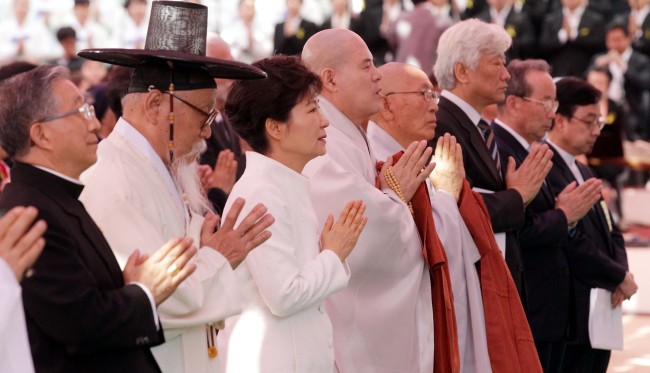From “trustpolitik” to the Dresden declaration, President Park Geun-hye’s signature North Korea initiatives face strong headwinds as the defiant neighbor ratchets up threats of another nuclear test and criticism against her administration.
While adopting a dual-track approach of reengagement and deterrence shortly after taking office, Park launched a campaign for unification as the centerpiece of her term’s second year, saying it would present a “bonanza” to all Koreans and a chance for the unified peninsula to make an economic leap forward.
She then proposed greater humanitarian aid and economic exchanges with the North to help lay the groundwork for eventual integration in a speech in the former East German city of Dresden late March.
For all her efforts, however, the peninsula appears to be confronting another flare-up in tension. Pyongyang has threatened a fourth atomic blast to beef up its deterrence, and restarted slandering its southern neighbor in breach of a February agreement.
Casting the darkest cloud is the prospect of a nuclear experiment, which will drag the world back into a cycle of U.N. Security Council condemnation and sanctions followed by additional North Korean provocations.
For Seoul, that means no political leeway for the next few years.
“Like all her predecessors, Park will want to leave a legacy in cross-border relations, especially as the first-ever president who has previously met with a North Korean leader,” a senior government official said on condition of anonymity due to the sensitivity of the matter.
“She is likely ruminating on how to move things forward, with all possible scenarios in mind.”
Almost every foreign policy and security initiative introduced by Park has triggered skepticism over feasibility and substance.
Pyongyang has been among the fiercest critics. The Rodong Sinmun, a mouthpiece of the ruling Workers’ Party, on Saturday again urged Park to choose between “confrontation and trust,” labeling her “trustpolitik” doctrine as a “slogan to wage an aggressive war against the North.”
The much-trumpeted initiative was designed to reengage the North while deterring its saber-rattling by gradually forging trust through small projects, which would then lead to greater collaboration based on its denuclearization.
Pyongyang has stepped up its verbal onslaught against the South, the U.S. and their North Korea policies in particular since the allies began their annual joint military drills in late February.
Some experts and even government officials pointed out a lack of fresh, concrete and realistic action plans.
“North Korea is no normal state, but (the president’s) proposals treat it like one,” Hong Hyun-ik, a senior researcher at the private Sejong Institute, had said after the Dresden speech.
“To help turn the pariah state to a normal one, you need to give them some immediate, tangible incentives. … And if you truly want North Korea to give up nuclear weapons, you should address its security concerns.”
A ranking Seoul official dismissed the need to offer inter-Korean dialogue at present, saying, “It is no effective way to respond at a time when the other side attempts to rattle the peninsula by threatening a nuclear test.”
Nonetheless, Seoul has vowed to stick to the Dresden project, which includes the establishment of inter-Korean cooperative offices, a joint agricultural complex and further economic support in line with the communist state’s denuclearization.
“We did not put out the Dresden initiative for no reason ― we meant to pursue it,” Ju Chul-ki, senior presidential secretary for foreign and security affairs, told a recent unification forum hosted by the state-run Korea Institute for National Unification.
By Shin Hyon-hee (
heeshin@heraldcorp.com)








